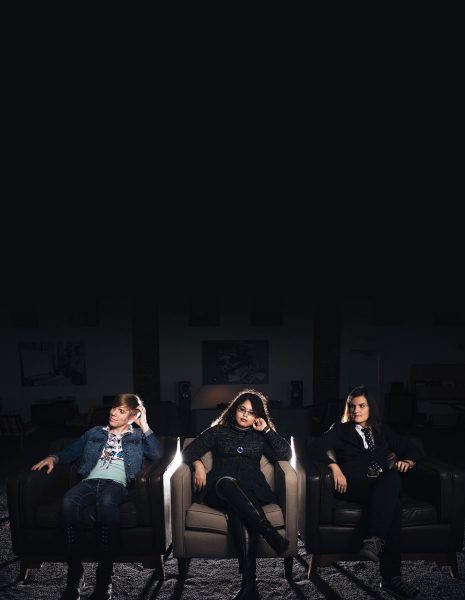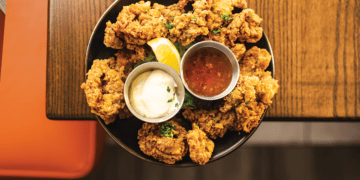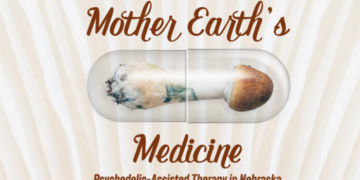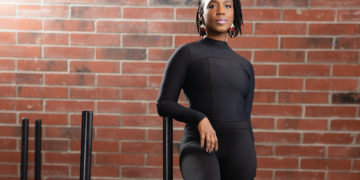Make no mistake about it — Eris Koleszar, Cara Heacock, and Anna Schmidt knew what they were doing when they named their band The Boner Killerz. Koleszar, a big fan of musician/comedian Lane Moore, noticed a photo Moore had posted on her Twitter account boasting a “Feminist Killjoy” necklace, which sparked the entire idea.
“The way the necklace looked and the way I was feeling about myself, my world and my desire to be in a band all connected through that phrase,” Koleszar explains. “I knew I wanted a band with a name that screamed the same values. One night, The Boner Killers popped into my head. I grabbed up the social media handles and when I formed the band, Anna gave it the final touch with the ‘z’ at the end.”
With Koleszar on guitar/lead vocals, Schmidt on drums, and Heacock on bass (which is really all that’s needed for a proper rock band), The Boner Killerz have dialed in on their ideal musical formula — loud, explosive, and full of heart. But they also have a very specific mission in mind. Koleszar, who identifies as transgender, strives to be influential for all types of people.
“We want to be an inspiration for young women, queer people, and trans folx, and show that they can form bands and rock out,” Koleszar explains. “In a sea of music that is cisgender, heterosexual, white male-dominated, we want to create a space for other people, too.

“I would love to see a world in which all kinds of people had access to equipment, spaces, and mentorship to create, perform, and record music,” she continues. “I don’t think there’s a lot of overt exclusion from spaces and access, but I still see a lot of music in the scene created by the same kinds of people.”
Although the group formed in March 2016, The Boner Killerz have just released their first proper EP, All Boner Killerz/No Boner Fillerz. It’s the result of the trio’s instant chemistry, something they’re all grateful for having.
“I feel like compared to other band experiences that I’ve had, this is by far the most chill one,” Heacock says. “The Boner Killerz is my first serious band venture, and to be honest, it has been the most fun compared to my last attempts to start or join a band. The three of us just mesh really well and I have a lot of fun writing and playing music with these ladies.”
All three members grew up with some kind of music in their household. Koleszar’s father was the music leader of their rural Indiana church and the young Koleszar would mirror her father’s conducting. Then her friends were immersed in ska and punk music in middle school until her former girlfriend introduced her to emo.
“There was an incredibly small emo/punk/folk punk/melodic-hardcore/post-hardcore scene in that part of Indiana,” Koleszar explains. We did whatever we could to feel alive through our music in a place where there really wasn’t much going on at all.”
Schmidt’s experience was similar. Growing up in Central Nebraska, her father was an avid record collector who introduced her to classic rock. As she got older, like most adolescents, she started to form her own identity.
“I listened to the pop hits radio station religiously,” Schmidt says. “Nineties pop music still holds a strong sense of nostalgia for me. During my teenage years, my tastes evolved. The internet was a huge influence, and exposed me to the grunge and emo scene. Of course, the early ’00s Omaha music scene also left an impact on me.”
On the other hand, Heacock, who also grew up on classic rock like The Beatles, Fleetwood Mac, and the Beach Boys, was more drawn to metal, an element she brings to the band.
“When I started forming my own taste in music as a preteen and teenager, I listened to anything vaguely in the rock genre, including pop rock on the radio and nu-metal when that was a thing,” Heacock says. “I feel like I’m the one that brings the vaguely metal sound to some of our songs because I’m still pretty into metal.”
Although The Boner Killerz are relatively new to the Omaha music scene, they seem to have found their niche rather quickly. In fact, they often have to turn down opportunities to play live because of their packed schedule. But it’s their live shows that are so intriguing and leave people wanting more.
“I can feel that people do want to connect in meatspace and have personal interactions,” Koleszar says. “I like that we play small venues and meet new people at our shows, and deepen connections with the people we already know. Personally, I have a special connection to those bands I fell in love with at a show and got to talk to even briefly.” 
“We want to be an inspiration for young women, queer people, and trans folx, and show that they can form bands and rock out.”
Visit thebonerkillerz.bandcamp.com to find hear their music.
This article appears in the January/February 2018 edition of the Encounter.













